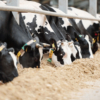ORONO, Maine — The University of Maine Cooperative Extension will offer a “Growing Small Fruit on Your Farm” course from 1-2:30 p.m. on Tuesdays, Oct. 17, 24 and 31, and Nov. 7 and 14.
The comprehensive online workshop is designed to provide participants with the knowledge and skills necessary to cultivate and raise a variety of small fruits, including strawberries, high-bush blueberries and raspberries. Participants will learn practical strategies to help with small fruit selection, site preparation, crop management and post-harvest handling. Topics include the introduction to growing small fruit in Maine; strawberry, raspberry and blackberry production; high-bush blueberry production; and small fruit pest management.
The course, geared towards both in-home gardens and commercial farms, will also illustrate the essential steps needed to make berry planting a rewarding experience.
Program facilitator David Handley is a vegetable and small fruit specialist and a UMaine Extension professor. He is based at Highmoor Farm, one of the Maine Agricultural and Forestry Experiment Station research facilities, in Monmouth and conducts applied research regarding berry and vegetable variety evaluation, production techniques and pest management strategies.
A stable internet connection, an email address and access to a computer with video and audio capabilities is required. The program cost is $60 per person. Registration is required by Oct. 13.
For more information, to register or to request a reasonable accommodation, visit the program’s webpage or contact Stephanie Wright, [email protected]; 207.933.2100.
About University of Maine Cooperative Extension: As a trusted resource for over 100 years, University of Maine Cooperative Extension has supported UMaine’s land and sea grant public education role by conducting community-driven, research-based programs in every Maine county. UMaine Extension seeks to build thriving communities and grow the food-based economy, focusing on aspects from production and processing to nutrition, food safety and food security. Extension also conducts the most successful out-of-school youth educational program in Maine through 4-H which offers hands-on projects in areas like health, science, agriculture and civic engagement and creates a positive environment where participants are encouraged to take on proactive leadership roles.
About the University of Maine: The University of Maine, founded in Orono in 1865, is the state’s land grant, sea grant and space grant university, with a regional campus at the University of Maine at Machias. UMaine is located on Marsh Island in the homeland of the Penobscot Nation. UMaine Machias is located in the homeland of the Passamaquoddy Nation. As Maine’s flagship public university, UMaine has a statewide mission of teaching, research and economic development, and community service. UMaine is the state’s public research university and a Carnegie R1 top-tier research institution. It attracts students from all 50 states and 86 countries. UMaine currently enrolls 11,571 undergraduate and graduate students, and UMaine Machias enrolls 763 undergraduates. Our students have opportunities to participate in groundbreaking research with world-class scholars. UMaine offers 77 bachelor’s degrees and six undergraduate certificates, as well as more than 100 degree programs through which students can earn doctoral or master’s degrees, professional master’s degrees, and graduate certificates. UMaine Machias offers 18 associate and bachelor’s degrees, and 14 undergraduate certificates. The university promotes environmental stewardship, with substantial efforts campuswide to conserve energy, recycle and adhere to green building standards in new construction. For more information about UMaine and UMaine Machias, visit umaine.edu and machias.edu.
–University of Maine Cooperative Extension







